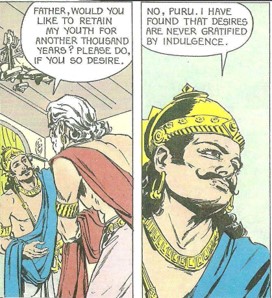Talk:Moderation in Kāma in Gṛhastha Dharm
By Vishal Agarwal
A lack of discipline while pursuing pleasures, and addiction of even one of five sense organs can lead to complete ruin.
- The deer, the elephant, the moth, the honeybee and the fish – these five are destroyed due to addiction to their five sense organs. [deer (ear) – listens to sweet music and thus caught by the hunter; elephant (touch) – caught through she-elephant; moth (eye) – attracted by the color of the flame and burnt; honeybee (nose) – attracted by the fragrance of lotus and caught within; fish (taste) – nibbles at the bait and thus caught. Even one of these organs is destructive. How is it possible that man who uses all the five will escape destruction?] Garuḍa Purāṇa 1.115.21
The following is a beautiful story narrated in the Purāṇas like the Brahma Purāṇa and the Matsya Purāṇa.
Story: No One Ever Gets Satisfied with Kāma[edit]
Many people say – “There is only one life. So let us enjoy. Who knows if there will be a tomorrow.” Purāṇas narrate the story of Emperor Yayāti who was devoted excessively to the pleasures of senses.
Emperor Yayāti had two wives and many sons. He loved to live a ‘good’ life, indulging in all kinds of pleasure. When he grew old, he was unable to indulge in such pleasures, but his manas still longed for them. So he asked his sons to exchange his youth for his father’s old age. The first three sons refused, and out of anger, he cursed them. The fourth son Puru was very obedient and he exchanged his youth for his father’s old age.
And then, Yayāti lived through another youth and enjoyed pleasures of senses. When he grew old again, he realized that he was still not satisfied. Now Yayāti felt very guilty that he had cursed his own sons, and deprived his own obedient son of his youth which had rightfully belonged to his son alone. And even after living a second youth, his desires for physical pleasures were not satisfied.
He realized the folly of having deprived his own son of his youth, and narrated the following famous verses quoted in several Purāṇas (Brahma Purāṇa 10.40–46):
- He who withdraws within himself all pleasures like the tortoise that draws his limbs within itself is indeed a person who has attained the state of yog. Never does desire for pleasure subside by indulging in their enjoyment. Just as the fire blazes all the more when ghee is poured into it, so also it increases at every indulgence.
If one were to possess all the grains of rice and barley on the earth, if one were to possess all the gold, if one were to become the master of all the cattle wealth on the earth or if one were to marry all women on the earth he will discover that even this is not sufficient to satiate his thirst.
That being so, one should not be deluded by these things. When one does not have any ill will towards any living being, whether in mind, in word, or in deed, then only does one attain Brahman.
When one is not afraid of others, when none is afraid of him, or when one does not like or dislike others too much, then alone one attains Brahman.
Happiness befalls a person who eschews greed and covetousness evils which can never be eschewed by the wicked, evils which do not become old even when one’s own body becomes old and decrepit, evils which are like an ailment that comes to end only when the vital airs die out.
When a man becomes old, his hair become old, his teeth become old; but alas! The hope and greed for wealth and a prolonged life never grow old!
The happiness that supposedly arises from indulgence in pleasures and also the great happiness that one attains in heaven — all these are not equal to even the 16th part of the happiness one attains when his greed is extinguished. Brahma Purāṇa 10.40 - 46
Yayāti then decided to devote the remainder of his life to worship God, practice yog and understand the nature of the truth. And when he died, he went to heaven.
This story shows how a blind pursuit of pleasures of the senses (tongue, eyes, ears etc.) makes us so selfish that we forget the welfare of even our closest friends and family. Therefore, we should realize that there are more important things in life dharm and God. These alone should be our more important goals of life. Surely, we should pursue kāma and artha, but with the understanding that dharm and mokṣa are more important than these two. What are intended to be ‘little pleasures’ must not become addictions or they will lead us to our total ruin.

